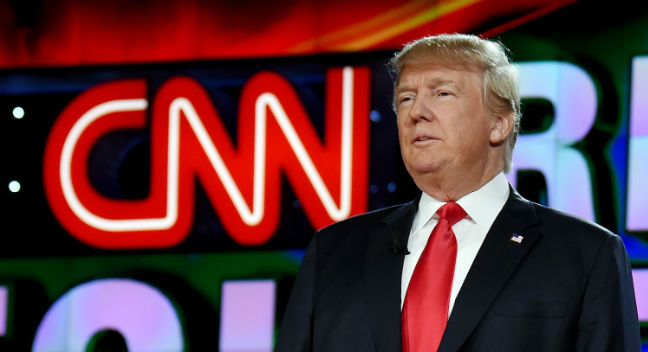
Last night at the GOP debate, Donald Trump said, “The biggest problem we have is nuclear – nuclear proliferation and… having some madman go out and get a nuclear weapon.” But is he right? Do we really have that to fear?
Not really. While Hollywood makes acquiring nuclear weapons seem as simple as giving a Russian arms dealer your credit card number, the reality is far more complicated. There are three fundamental issues with using a nuclear weapon: Finding the raw materials, building it, and getting it where you want it to go.
First of all, ISIS or whoever isn’t going to make the more complex, dangerous fusion weapon, also known as the hydrogen bomb. They’re going to make a simpler fission weapon, also known as an atom bomb. They are, technically, simpler to build. But so is IKEA furniture; there’s a lot that can go wrong, here.
Let’s start with the raw materials: Depending on the type of bomb you want to build, you’ll need either uranium or plutonium, and not just these metals themselves, but specific isotopes of them, like uranium-235. This requires enriching the uranium to be “fissile.” If you go the plutonium route, you really don’t find a more dangerous metal in nature. That makes this stuff hard to mine, harder to refine into nuclear material, and usually tightly controlled by world governments, yes, even places like Russia. That also makes it all ridiculously expensive, even before you factor in that selling a terrorist organization nuclear material is likely a one-way ticket to the noose.
So, that’s the first hurdle, but let’s say that ISIS somehow manages to raise the money and find somebody unethical enough to sell them fissile materials. Now they have to get those fissile materials to explode, and again, this is a lot harder than it sounds. A nuclear weapon essentially smacks together two pieces of nuclear material in the hope of triggering a chain reaction or tries to squish it into a smaller ball to set off a nuclear chain reaction; that is, to get the fissile material to release neutrons, and thus the energy that binds these neutrons, and to keep doing it with every atom of the material.
The theory is simple enough. In practice, you have to slam these two things together quickly or you’re not getting the explosion; it’ll start reacting before touching and you’ll get a fizzle. A fizzle can still be bad news, as it can release radiation or yield a smaller explosion, but that brings us to the biggest problem any would-be Bond villain will face: Launching it.
If a government is ever going to launch a nuclear weapon, that nuke will likely be at the tip of an intercontinental ballistic missile. If you think nuclear weapons are complex, try figuring out how to launch a rocket into space and have it land exactly where you want it to; we use “rocket science” as the standard of “stuff that’s hard to understand” for a reason. Which is moot anyway, because most terrorist organizations will never get their hands on one; even if the technology were out there, which it isn’t, they could never afford it. Heck, America can barely afford it.
So, they would have to import this nuke, which is extremely heavy and radioactive, with a boat or a truck. Odds are pretty good, provided this thing doesn’t go off en route, that they’d be quickly caught by authorities, since a giant, radiation-spewing vehicle tends to make itself known.
So, what about a “rogue nation-state?” Couldn’t they pull this off? First of all, this isn’t a vacuum; pretty much nobody wants countries like Iran or North Korea to have nuclear capability, not even their supposed “allies.” Secondly, who would they launch it at? Assuming their technology works and the missile didn’t explode in its silo, firing a nuclear weapon is, obviously, an act of war on that nation, and no country that might do this would win that war. And, more to the point, everyone, including dictators like Kim Jong-un, knows it.
This is not to say nuclear proliferation isn’t a concern; even a “limited” nuclear conflict, or the far more likely issue of a nuclear weapon accidentally going off in a terrorist’s home country, would have disastrous environmental, social, and geopolitical effects. But a madman getting a nuke is likely to take a backseat to other problems of national security for whoever is elected in 2016.
